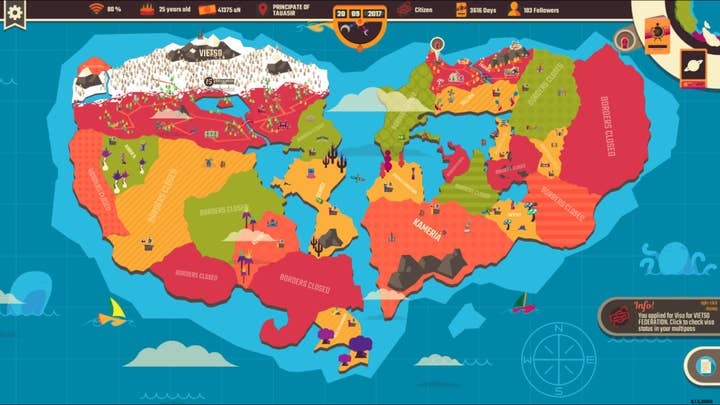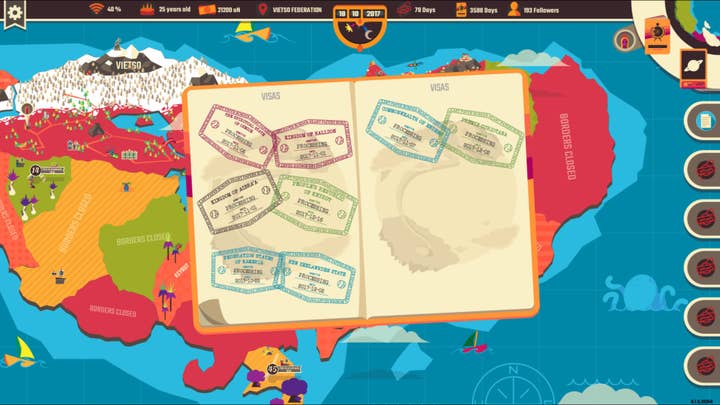Mastering feature creep while changing the world
Jovian Industries' Laura Bularca on a philosophical approach to efficient and effective game development
Releases are often postponed, and we all know why. Feature creep; endless polish and refactoring because we, as developers, strive for perfection. How do you prevent striving for quality from leading to excess?
We must focus and embrace the moment when these games finally gain wings. We must find a way to love the moment that all developers dread the most: the release.
Making games is feature creep
What is feature creep? Wikipedia offers a useful definition: "The ongoing expansion or addition of new features in a product... These extra features go beyond the basic function of the product and can result in software bloat and over-complication, rather than simple design."
Games are anything but simple design. Games are products that generate complex experiences by combining code with art, sound, movement and interaction, while giving up control and empowering an external entity, the player. Games can be "finished", but they only become alive in the hands of their players, and the results can often surprise even their own creators.
"Games can be 'finished', but they only become alive in the hands of their players, and the results can often surprise even their own creators"
You can never really predict how a game will turn out, and even less how it will be used by its audience, so keeping the production of a game in check and having a clear list of features to be developed over many months (or, more commonly, years) is a little bit utopian. I'd dare say that the process of making a game is feature creep until its creator has managed to express what they envisioned at the start, but that leaves us with a volatile industry that delays its products, under delivers, or both.
To counter this grim take on games production, many developers choose to stay close to what they know. This is why so many games can be pitched using the "Chocolate and Peanut Butter" technique: it's like Game X but with successful elements from Game Y. However, this can be detrimental to creating an innovative product that aims to go deeper.
We are aiming deeper with our game, Heart. Papers. Border. We struggle with feature creep frequently, and even though years of production and project management tricked me into thinking that rigorous planning and proper task accountability is enough to keep a game on track, in the end it was different methods that helped us the most.
These methods had less to do with production, and more to do with perspective, philosophy and design.

Release is the beginning, not the end
Heart. Papers. Border is an optimistic strategy game about travelling, freedom and changing the world. The current state of global politics, the growing influence of nationalist movements, and the ongoing refugee crisis are subjects that have a profound impact on us, and Heart. Papers. Border is our way of making change in the world.
Through this game, we hope to make people think about the privilege or misfortune of being born in a certain place, about the joys of travelling and discovering that everyone has much more in common with you than you'd think, and about the sorrow and injustice barriers can generate.
"We feel responsible for the impact our products have. In the games industry we often don't take that responsibility seriously enough"
As creators, we feel responsible for the impact our products have. In the games industry we often don't take that responsibility seriously enough, and we forget that are games can have a strong influence on our players. If most of the games we develop focus around adrenaline, competition and destruction, the stories they tell will be about adrenaline, competition and destruction. Anyone interested in an alternative will immediately recognise a lack of balance.
With that in mind, the single most important thing we can do with Heart. Papers. Border is to deliver, and the current global context only contributes to my sense of emergency. We must do what we can to kickstart positive conversations about our similarities, about kindness and willingness to help. There is no time to waste.
I feel a sense of dread, one groomed by an industry obsessed by perfection - god knows every task I mark as 'done', I know we can do better - but the human in me anticipates the moment of Heart. Papers. Border.'s release. I look at it as the moment when we can start building relationships with our players.
This is the philosophy that has helped us to stay focused.
Start with the meaning
We take the meaning of Heart. Papers. Border seriously. The execution, and what that suggests about us and our skills, takes a secondary role. This helps us be more severe when it comes to refactoring and allowing new features.
The industry often underestimates its power. Games influence their players whether we like it or not, and far too many games are developed purely 'for fun'. But fun is subjective and very hard to define, especially if you factor in the diversity of the global audience. That audience can respond to much more than just fun.
Respect your design pillars
"Our target audience lurks on travel sites and digital nomad Reddit groups... Many of them don't know about Steam or GOG or Humble Bundle"
The core design pillars of the game are all related to its meaning: optimism, a sense of achievement, curiosity, statement and balance. All of the game's features are measured against these pillars, and therefore against the meaning. Every time we talk about a new feature, we ask ourselves: is this an optimistic feature? Does it offer a sense of achievement? Will it spark the kind of stories we want to tell? Does it make the player curious? Does it fit with the rest of the game, thus balancing what we have created so far?
Understand your target audience
Our target audience isn't strategy simulator players who enjoy games like Papers, Please! or Plague Inc. Our target audience is our friend Michela, a 36 year-old mother who is passionate about travel, but is grounded at home by her children. Our target audience lurks on travel sites and digital nomad Reddit groups. Our target audience is very curious about today's news. Many of them don't know about Steam or GOG or Humble Bundle. Every time a new feature knocks at our backlog door, we ask: would Michela think it's worth waiting for?

Scrutinise everything, no matter how small
Features can occasionally seem so small that they avoid the Pillars test - or any test, for that matter. They are so easy to develop, and you feel thankful for the extra value they add despite the ease of implementation. We made it a rule to scrutinise any trick or feature, no matter how simple, but it was a lesson we learned the hard way.
"We made it a rule to scrutinise any trick or feature, no matter how simple, but it was a lesson we learned the hard way"
Heart. Papers. Border is a fairly static 2D game. We thought it might seem lifeless, so just a few days before our first big game show, Casual Connect in Berlin, we decided to add some passing clouds. The visual effect was excellent, but the clouds made gameplay actions difficult because they covered the interactive map. What started as an easy fix became an entire debate about dynamic transparency, offering nothing but a little extra movement with no gameplay gains whatsoever.
Manage your project wisely
The project management triangle states that the quality of work is constrained a project's budget and time. In this model, a game's quality can only be guaranteed by being generous with time or money.
We reject this. Working iteratively with playable prototypes allowed us to work wisely, and not just work hard. We selected several trade shows to present, playtest and gather feedback. Since every event required a working build, marketing materials and demonstrable progress, we had no choice but to scrutinise the workload and practically any new idea that sneaked into the backlog.
Stay healthy, rested and happy
I still feel shame when progress is slow. I am quick to call myself lazy, even if I'm just tired or burned out.
So when I notice this happening, I take a mental and physical break. I attend game jams, focus on a totally different kind of mechanic or perspective, and just release some creative steam.
Staying healthy, happy and rested is the the most important tip. You cannot trust your judgement if you're tired, stressed or sick. Besides, tired, stressed and sick people tell depressing stories - just look around. It would be a terrible state of mind in which to make an optimistic strategy game about travelling, freedom and changing the world.







